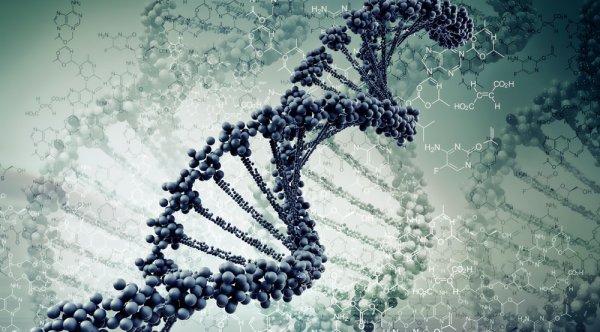HiPACC Data Science Press Room. From: UCSF
The Data Science Press Room highlights computational and data science news in all fields *outside of astronomy* in the UC campuses and DOE laboratories comprising the UC-HiPACC consortium. The wording of the short summaries on this page is based on wording in the individual releases or on the summaries on the press release page of the original source. Images are also from the original sources except as stated. Press releases below appear in reverse chronological order (most recent first).
November 6, 2014 — New software platform bridges gap in precision medicine for cancer
UCSF 11/6/2014—UC San Francisco has unveiled a new cloud-based software platform that significantly advances precision medicine for cancer. Built in partnership with Palo Alto-based company Syapse, the new platform seamlessly unites genomic testing and analysis, personalized treatment regimens, and clinical and outcomes data, crucially integrating all of these features directly into UCSF’s Electronic Medical Record (EMR) system. The project was a collaborative venture of UCSF’s Genomic Medicine Initiative (GMI) and the UCSF Helen Diller Family Comprehensive Cancer Center.
View UCSF Data Science Press Release
October 22, 2014 — UCSF team awarded multimillion-dollar agreement with CDC
.jpg)
UCSF 10/22/2014—A UC San Francisco-based consortium has been awarded a multimillion-dollar, five-year cooperative agreement with the U.S. Centers for Disease Control and Prevention (CDC) to conduct economic modeling of disease prevention in five areas: HIV, hepatitis, STI (sexually transmitted infections), TB (tuberculosis), and school health. Called the Consortium for the Assessment of Prevention Economics (CAPE), it will conduct economic analyses including costing, cost-effectiveness analysis, cost-benefit analysis, resource allocation, and return on investment. CAPE—led by James G. Kahn, MD, MPH, and Paul Volberding, MD, both faculty in Global Health Sciences—includes 39 investigators from UCSF; Stanford University; UC Berkeley, UC Davis, UC San Diego; the San Francisco Department of Public Health, Health Strategies International, and PATH. CAPE will be based at the UCSF Philip R. Lee Institute for Health Policy Studies; it was awarded $1.6 million for the first year, and $8 million over the full project period.
View UCSF Data Science Press Release
September 11, 2014 — Our microbes are a rich source of drugs, UCSF researchers discover
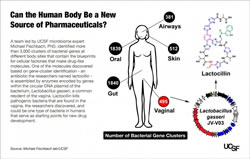
UCSF 9/11/2014—Bacteria that normally live in and upon us have genetic blueprints that enable them to make thousands of molecules that act like drugs, and some of these molecules might serve as the basis for new human therapeutics, according to UC San Francisco researchers in a study published in the Sept. 11 issue of the journal Cell. Microbiomes—ecosystems made up of many microbial species—are found in the gut, skin, nasal passages, mouth and vagina. Scientists have started to identify microbiomes in which species diversity and abundance differ from the normal range in ways that are associated with disease risks. By developing new data-analysis software and putting it to work on an extensive genetic database developed from human-associated bacterial samples collected as part of the National Institutes of Health’s ongoing Human Microbiome Project, the UCSF lab team identified clusters of bacterial genes that are switched-on in a coordinated way to guide the production of molecules that are biologically active in humans.
View UCSF Data Science Press Release
September 10, 2014 — UCSF, Google Earth Engine making maps to predict malaria
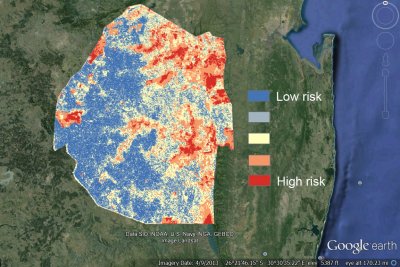
A sample risk map of malaria in Swaziland during the transmission season using data from 2011–2013.
UCSF 9/10/2014—UC San Francisco (UCSF) is working to create an online platform that health workers around the world can use to predict where malaria is likely to be transmitted using data on Google Earth Engine. The goal is to enable resource-poor countries to wage more targeted and effective campaigns against the mosquito-borne disease, which kills 600,000 people a year, most of them children. Google Earth Engine brings together the world’s satellite imagery—trillions of scientific measurements dating back almost 40 years—with data-mining tools for scientists, independent researchers and nations to detect changes, map trends and quantify differences on the Earth’s surface. Local health workers will be able to upload their own data on where and when malaria cases have been occurring and combine it with real-time satellite data on weather and other environmental conditions within Earth Engine to pinpoint where new cases are most likely to occur. That way, they can spray insecticide, distribute bed nets or give antimalarial drugs just to the people who still need them, instead of blanketing the entire country. By looking at the relationship between disease occurrence and factors such as rainfall, vegetation and the presence of water in the environment, the maps will also help health workers and scientists study what drives malaria transmission. The tool could also be adapted to predict other infectious diseases.
View UCSF Data Science Press Release
September 4, 2014 — A Q&A on the future of digital health
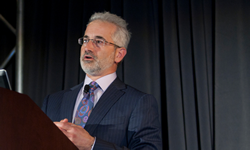
Michael Blum, director of the Center for Digital Health Innovation, speaks at a recent conference.
UCSF 9/4/2014—We recently sat down with Michael Blum, director of UCSF’s Center for Digital Health Innovation, to talk about the future of health wearables and what more accurate health data could teach us about improving patient care. Among the topics he brought up: One of the first things we are going to find is that a lot of real world health data and information about the general public looks very different than it did in highly controlled clinical trials. When we start to get these very large, detailed real-world data sets we may be very surprised to see the answers.
View UCSF Data Science Press Release
August 8, 2014 — Cancer categories recast in largest-ever genomic study
UCSF 8/7/2014—New research partly led by UC San Francisco-affiliated scientists suggests that one in 10 cancer patients would be more accurately diagnosed if their tumors were defined by cellular and molecular criteria rather than by the tissues in which they originated. Such information, in turn, could lead to more appropriate treatments. In the largest study of its kind to date, scientists analyzed molecular and genetic characteristics of more than 3,500 tumor samples of 12 different cancer types using multiple genomic technology platforms.
View UCSF Data Science Press Release
July 30, 2014 — Gene behind rare birth abnormality Is a window on evolution

UCSF 7/30/2014—A developmental protein called ectodysplasin, if defectively encoded in a key gene, causes a rare human birth defect: a shortage or absence of sweat glands, misshapen and absent teeth, and loss of hair follicles—all appendages that develop from the same embryonic tissue. Previously, researchers in Switzerland had found that the syndrome in mice can be treated during the mother’s gestation by administering the missing ectodysplasin—the first demonstration that a structural birth defect could be prevented with a medical approach. Now, a UC San Francisco (UCSF) physician who treats birth defects affecting the face has teamed up with a European expert on animal evolution to see if the same biochemical pathway also could be manipulated to study evolution. In an analysis conducted through computer modeling and the measurement of teeth from different mammals, the scientists showed how both rodents and carnivores—including later-evolving mammals such as the lion, wolf, and bear—follow the same rule of shape change suggested by the experiment. The study was published in the journal Nature.
View UCSF Data Science Press Release
May 27, 2014 — New venture aims to understand and heal disrupted brain circuitry to treat mental illnesses

UCSF 5/27/14—Scientists and physicians at UC San Francisco are leading a $26 million, multi-institutional research program in which they will employ advanced technology to characterize human brain networks and better understand and treat a range of common, debilitating psychiatric disorders, focusing first on anxiety disorders and major depression. The overall strategy is to first identify brain signaling pathways specifically associated with anxiety and depression, then to develop devices to provide precise stimulation therapies that guide the brain to strengthen alternative circuits. By leveraging the brain’s natural capacity for neural remodeling and learning, this approach will potentially allow the newly strengthened circuits to bypass the disease-associated signals and thereby eliminate symptoms. The project team will address psychiatric disorders in a new way, taking a “systems-level” approach. Instead of focusing on specific cellular processes to target with drugs, the researchers will seek to understand these disorders as disruptions of a complex network.
View UCSF Data Science Press Release
May 15, 2014 — UCSF 2.0: Converting data to knowledge, insight and action
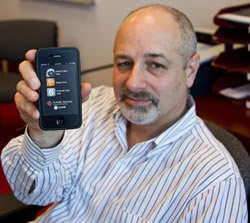
Jeffrey Olgin, MD, chief of the division of Cardiology, displays an application he developed as part of the Health eHeart Study to reduce heart disease that monitors vital signs during daily activities.
UCSF 5/15/14—UC San Francisco scientists and clinicians are working on many projects to convert data to knowledge, insight and action, one of the areas of innovation identified in the strategic planning effort known as UCSF 2.0. Cardiologist and electrophysiologist Jeffrey Olgin, MD, along with UCSF colleagues Mark Pletcher and Gregory Marcus, are leading the UCSF-developed Health eHeart study. Funded by the Salesforce.com Foundation and endorsed by the American Heart Association, the study aims to enroll 1 million people from around the world to use their smartphones to send their health data to study doctors so they can better understand how the heart functions and develop new ways to predict and prevent cardiovascular disease.
View UCSF Data Science Press Release
April 8, 2014 — Groundbreaking online registry to drive brain disease research
UCSF 4/8/14 — A new online project led by researchers at UC San Francisco promises to cut the time and cost of conducting clinical trials for brain diseases, while also helping scientists analyze and track the brain functions of thousands of volunteers over time. With easy online registration, the Brain Health Registry is designed to create a ready pool of research subjects for studies on neurological diseases, such as Alzheimer’s and Parkinson’s, as well as depression, post-traumatic stress disorder, and many other brain ailments. About one-third of the cost of running a clinical trial comes from having to recruit patients, and many trials fail or are delayed because of it. The Brain Health Registry is the first neuroscience project to use the internet on such a scale to advance clinical research.
View UCSF Data Science Press Release
February 21, 2014 — Samsung, UCSF partner to accelerate new innovations in preventive health technology
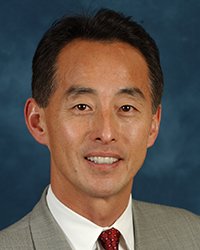
Young K. Sohn, president and chief strategy officer of Samsung Electronics
Samsung Electronics Co., Ltd., and UC San Francisco have announced a partnership to accelerate validation and commercialization of promising new sensors, algorithms, and digital health technologies for preventive health solutions. The two organizations will jointly establish the UCSF-Samsung Digital Health Innovation Lab, a new space located in UCSF’s Mission Bay campus in San Francisco, where some of the world’s leading researchers and technologists will be able to develop and run trials to validate exciting new mobile health technologies. The joint innovation lab will be a first-of-its-kind test bed where entrepreneurs and innovators will be able to validate their technologies and accelerate the adoption of new preventive health solutions.
View UCSF Data Science Press Release
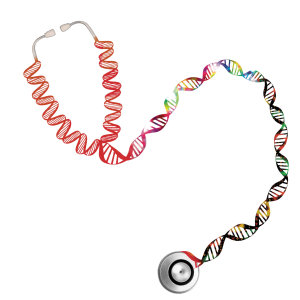
.jpg)



